Our Board of Directors
Meet the dedicated individuals guiding Three Zeros Initiatives Australia towards a sustainable and equitable future.
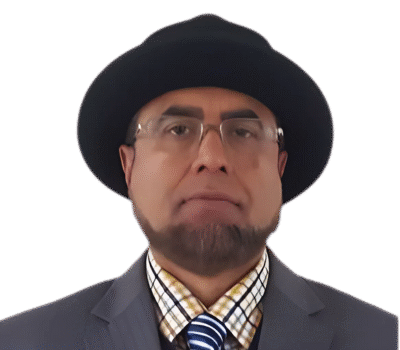
Professor Ataur Rahman
Chairperson
Professor Ataur Rahman is a distinguished authority in water, environment, and climate change, currently serving as a professor at Western Sydney University. With a Ph.D. in Water Engineering from Monash University, his expertise spans critical areas, including flood modeling, rainwater harvesting, water-sensitive urban design, and climate change studies. His profound impact on the field is highlighted by his role as a co-author of the official Australian Rainfall and Runoff guidelines and a co-developer of the ARR-RFFE flood risk assessment software.
Professor Rahman's international reputation is underscored by his visiting academic roles at prestigious institutions like Cornell University and Vienna University of Technology. His contributions to science have earned him a place among the top 2% of the world's scientists and a Fellowship with Engineers Australia. A prolific scholar, he has authored over 590 papers, which have garnered more than 10,000 citations, leading to an impressive h-index of 51.
He is also an award-winning supervisor, twice receiving the Vice Chancellor’s Excellence Award for Postgraduate Research, Training, and Supervision. Beyond academia, Professor Rahman provides expert consulting to government bodies and major firms, including the Australian Bureau of Meteorology and Sydney Water, reinforcing his practical influence on water management and environmental policy.
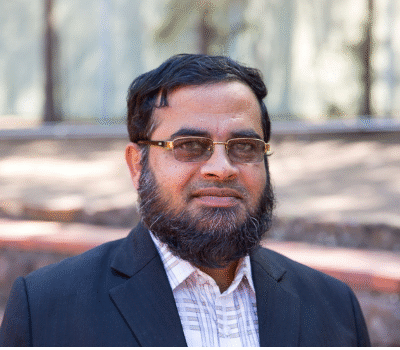
Assoc. Prof. Dr. Rafiqul Islam
Vice Chairperson
Dr. Rafiqul Islam is an Associate Professor of Computing at Charles Sturt University (CSU) and a leading figure in the field of cybersecurity. He is the Research Group Leader for Cybersecurity Research at CSU, where he guides a team of approximately 20 academics. His contributions have significantly enhanced the university's research profile, evidenced by a substantial increase in grant applications and a remarkable research output.
With a strong focus on malware and ransomware analysis, cloud security, and the Internet of Things (IoT), Dr. Islam has secured over $7.5 million in external project funding. Notably, he was a Co-Investigator on a successful $68 million Cybersecurity CRC, which led to one of his projects being named the Australian Cybersecurity Researcher of the Year in 2021.
A prolific scholar, he has authored four books and approximately 230 peer-reviewed research papers. His work has a significant impact, with over 6,000 citations and an H-index of 35 on Google Scholar. Dr. Islam is an accomplished mentor, having supervised 14 HDR students to completion and receiving the Best Supervisor Award in 2021. He is also a Senior Member of IEEE and has held various editorial roles and conference chair positions, solidifying his national and international recognition in the cybersecurity community.
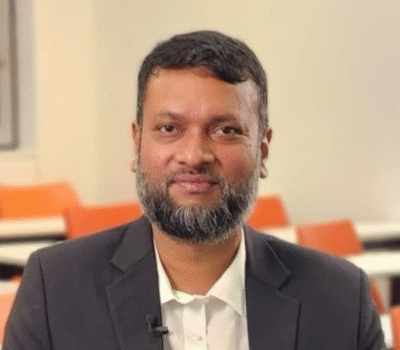
Prof. Dr. Mahfuz Ashraf
Secretary
Professor Dr. Mahfuz Ashraf is a distinguished academic and leader in Business, Information Systems, and Information Technology, with over two decades of experience in the higher education sector. He currently serves as Dean and Professor at the Lincoln Institute of Higher Education (LIHE) in Sydney, Australia, where he has been instrumental in shaping academic policies, curriculum development, and institutional strategy.
Throughout his career, Dr. Ashraf has been a key driver of educational innovation, playing a significant role in implementing MOOCs and developing industry-affiliated learning programs. He has successfully designed and led Bachelor and Master's programs in IT, Business, Entrepreneurship, and Innovation. His academic qualifications include a Ph.D. in Computing from the University of South Australia and a Master's in Information Systems Management from London South Bank University.
A prolific scholar, Professor Ashraf has authored over 50 publications in top-tier journals and conference proceedings. His work, which has been cited over 700 times, focuses on a range of critical areas, including information systems, health leadership, and ICT for development. He has successfully secured several research grants and is a dedicated mentor, having supervised over 40 research students at the master’s and doctoral levels. He is also the founder and leader of the Australian Journal of Artificial Intelligence Review, a platform dedicated to fostering AI research and innovation.
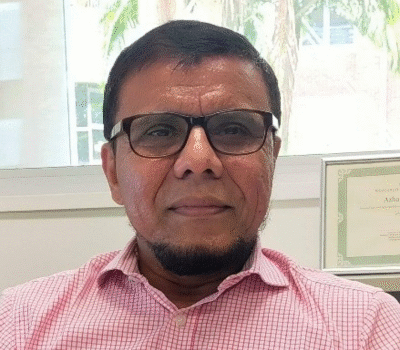
Professor Azharul Karim
Treasurer
Professor Azharul Karim is an internationally recognized expert in multiscale and multiphase drying modeling, with a primary research focus on solving critical problems within the food industry. He is currently a Professor in the School of Mechanical, Medical and Process Engineering at Queensland University of Technology (QUT). A highly accomplished researcher, Professor Karim has authored over 288 peer-reviewed articles, including 176 high-quality journal papers and six books. His work has amassed over 11,895 citations, resulting in an impressive h-index of 61.
His research's global impact is highlighted by an overall Field Weighted Citation Index (FWCI) of 2.09, and his papers are frequently ranked among the top 10% most cited worldwide. A dedicated mentor, he has successfully supervised 25 Ph.D. and nine M.Phil. students to completion and is currently guiding eight more.
Professor Karim’s influence extends beyond academia, as he has been a keynote speaker at 25 international conferences and has given invited seminars at prestigious universities globally, including Oxford University and the National University of Singapore. He founded the Advanced Drying and Sustainable Energy Research (ADSER) group, a multidisciplinary team dedicated to tackling complex challenges at the intersection of engineering, mathematics, and science. His contributions have been supported by over $4.2 million in external grants.
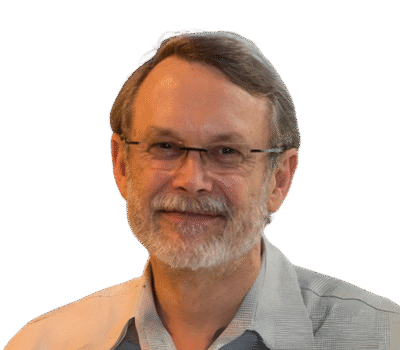
Prof. Dr. Roger Hadgraft
Executive Director
Dr. Roger Hadgraft is an esteemed Honorary Professor (retired) with a distinguished 30-year career dedicated to innovation in engineering education. A civil engineer by training, he has been a driving force behind curriculum renewal at several leading Australian universities, including Monash, RMIT, Melbourne, and the University of Technology Sydney (UTS).
Dr. Hadgraft is a pioneer of project-based learning (PBL), successfully implementing it across various engineering programs. At RMIT, he was a key figure in redesigning curricula around sustainability, a concept he further championed by establishing a Master of Sustainable Practice and a Bachelor of Sustainable Systems Engineering. His work culminated at UTS, where as Professor and Director of Educational Innovation, he spearheaded a major curriculum renewal that embedded a studio-based approach into both undergraduate and postgraduate engineering and IT programs. These studios fostered student career development while centering on project-based work.
A recognized national and international leader, Dr. Hadgraft has contributed to significant projects defining and assessing graduate outcomes, including the ALTC Academic Standards Project and the OECD's AHELO project. His extensive experience in staff development and quality assurance, combined with his research on curriculum architecture and student motivation, has profoundly impacted modern engineering education. His most recent publication is the open-access book, Reshaping Engineering Education: Addressing Complex Human Challenges.
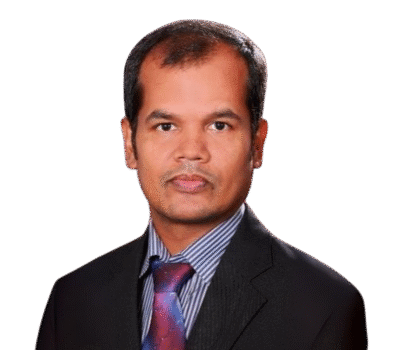
Prof. Dr. Jahangir Hossain
Executive Director
Professor Jahangir Hossain is a distinguished academic and researcher with over two decades of experience in Renewable Energy Integrations. Specializing in Wind Energy, Power System Analysis, and Power System Planning, he is currently a professor at the University of Technology Sydney's School of Electrical and Data Engineering. His extensive career is marked by his involvement as a principal or co-principal investigator in more than 30 projects, collectively securing over $5 million AUD in funding. These projects were supported by various prestigious organizations, including the Australian Federal and State Governments, the Australian Research Council, and numerous industries.
Dr. Hossain's academic journey includes a Ph.D. in Electrical Engineering from the University of New South Wales and a Master of Science and Bachelor of Science in Electrical and Electronic Engineering from Rajshahi University of Engineering & Technology.
A prolific author and editor, he has published over 400 works, including 5 books and more than 175 journal articles, with his research garnering over 11,000 citations and an h-index of 59 on Google Scholar. His professional leadership includes roles as an Associate Editor for prestigious journals like IEEE Access and as the Chair of the IEEE NSW Power and Energy Chapter. He is also a Senior Member of IEEE. His work continues to shape the future of sustainable energy.
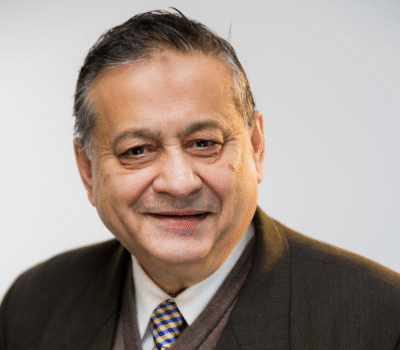
Professor Akhtar Kalam
Executive Director
Emeritus Professor Akhtar Kalam is a globally recognized leader in Electrical Power Engineering, with a career spanning over four decades. As a long-standing member of Victoria University since 1984, he has been lauded for his significant contributions to teaching, research, and professional leadership. He currently holds the position of Academic Director at Texila College Australia and serves as the Editor-in-Chief of the Australian Journal of Electrical & Electronics Engineering.
With over 600 publications and more than 30 books to his name, Professor Kalam is a prolific scholar. His expertise is highly sought after, as he is frequently invited to deliver lectures and oversee external theses internationally. He has also supervised the graduation of over 50 higher-degree research students, demonstrating a deep commitment to mentoring the next generation of engineers.
A registered Professional Engineer in Victoria, Professor Kalam maintains strong ties with the industry, providing expert consultancy to major electrical utilities, manufacturers, and other key organizations. His professional affiliations include being a Fellow of Engineers Australia and IET, and a Life Senior Member of IEEE. His work has been instrumental in securing research grants of approximately $1.5 million over the past five years, solidifying his reputation as a formidable force in both academia and industry.
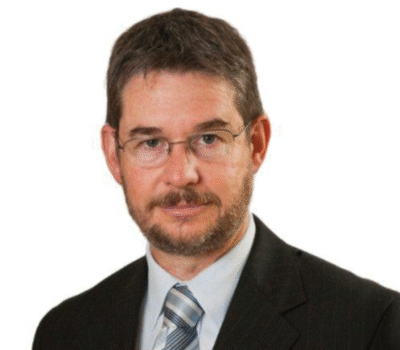
Dr Anthony Ladson
Executive Director
Dr Anthony Ladson has 39 years’ experience in hydrology and water management and has worked on projects throughout Australia and in the US, Taiwan and PNG. He has a PhD from the University of Melbourne and a Master of Science from the University of Minnesota. As well as being a Director of Moroka Pty Ltd, he is an adjunct Associate Professor at Victorian University, Australia. He has published 2 books, 10 book chapters and 141 refereed articles in journals and conferences. His Google Scholar citations are 9927, with an h-index of 27. He worked as a Senior Lecturer at Monash University and Research Fellow at the University of Melbourne. He was a member of National Committee of on Water Engineering in Australia. He is a Fellow of Engineers Australia. He is one of the authors of Australian Rainfall and Runoff (the national guideline).
He has worked extensively on flood hydrology including assessment of flood severity and damage, design and delivery of flood recovery works, joint probability assessments, and hydrologic modelling including estimation of model parameters, areal reduction factors, losses, temporal patterns of rainfall and design flood hydrographs. He has also worked in flood response, providing advice during flood events. He has developed, organised and delivered training courses on flood management to professionals and taught postgraduate flood hydrology units at Melbourne and Monash Universities. He also runs a hydrology blog (https://tonyladson.wordpress.com). In 2005 he received the GN Alexander Medal from Engineers Australia.
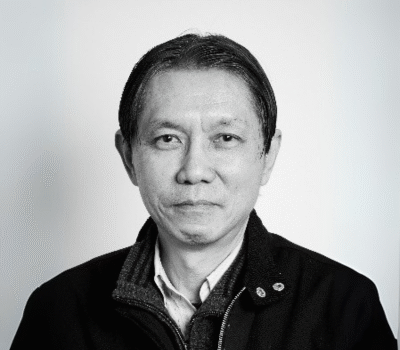
Professor Chin Jian Leo
Executive Director
Professor Chin Jian Leo is a distinguished civil engineer with extensive experience in geomechanical, geoenvironmental, and infrastructure engineering. His career began in the public works sector in Singapore, where he spent seven years designing and constructing major road infrastructure, including embankments, motorways, and tunnels. He transitioned into academia, earning a Ph.D. from the University of Sydney, and has since become a Professor at Western Sydney University.
Professor Leo's research focuses on a range of critical topics, including soft soils and poromechanics, soil-structure interactions, and the behavior of foundations and retaining structures. His work addresses practical challenges such as the consolidation of soft soils, tunnel closure, and contaminant transport. He also specializes in the characterization of various geomaterials, utilizing a combination of laboratory, field, and computational methods.
A prolific scholar, Professor Leo has authored and co-authored over 100 peer-reviewed journal publications. He is also an active participant in the global engineering community, having served as a keynote speaker at several international conferences and as an advisor to the Hong Kong Institution of Engineers. His expertise and leadership are further demonstrated by his roles as co-chair of the International Conference of Geomechanics and Geoenvironmental Engineering.
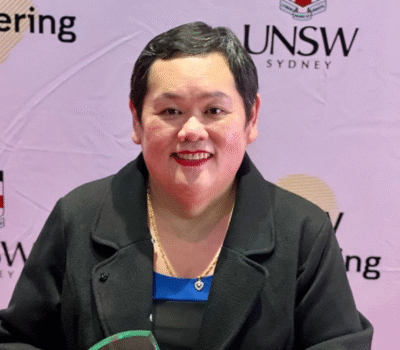
Professor Olivia Mirza
Executive Director
Professor Olivia Mirza is a leading Structural Engineering and Sustainability expert and a professor at Western Sydney University. A highly accomplished academic, she holds a Ph.D. in Structural Engineering and boasts a wealth of industry and research experience focused on infrastructure resilience and sustainability. Her work spans crucial areas such as the structural performance of fibre-reinforced concrete, fatigue and fracture mechanics, and life cycle cost analysis. She has also pioneered innovative research on the use of recycled plastic waste in healthcare and championed diversity in STEM education.
Dr. Mirza's remarkable contributions have been recognized with numerous accolades, including the 2024 Distinguished Academic Leadership Award and the 2023 UNSW Judy Raper Leadership Award. She was also recognized as a Top 15 Woman Engineer by Engineers Australia in 2020. A Chartered Professional Engineer and Fellow of Engineers Australia, she served as the President of the Sydney Division from 2023-2024.
Her notable achievements include serving as the principal investigator for the Parramatta Light Rail Stage 1 project and contributing to the rehabilitation of the Sydney Harbour Bridge railway. As a strong advocate for diversity, her efforts have significantly increased female participation in engineering at Western Sydney University. She has authored over 100 journal publications, with her work cited more than 2,400 times.

Professor Ataur Rahman
Chairperson
Professor Ataur Rahman is a distinguished authority in water, environment, and climate change, currently serving as a professor at Western Sydney University. With a Ph.D. in Water Engineering from Monash University, his expertise spans critical areas, including flood modeling, rainwater harvesting, water-sensitive urban design, and climate change studies. His profound impact on the field is highlighted by his role as a co-author of the official Australian Rainfall and Runoff guidelines and a co-developer of the ARR-RFFE flood risk assessment software.
Professor Rahman's international reputation is underscored by his visiting academic roles at prestigious institutions like Cornell University and Vienna University of Technology. His contributions to science have earned him a place among the top 2% of the world's scientists and a Fellowship with Engineers Australia. A prolific scholar, he has authored over 590 papers, which have garnered more than 10,000 citations, leading to an impressive h-index of 51.
He is also an award-winning supervisor, twice receiving the Vice Chancellor’s Excellence Award for Postgraduate Research, Training, and Supervision. Beyond academia, Professor Rahman provides expert consulting to government bodies and major firms, including the Australian Bureau of Meteorology and Sydney Water, reinforcing his practical influence on water management and environmental policy.

Assoc. Prof. Dr. Rafiqul Islam
Vice Chairperson
Dr. Rafiqul Islam is an Associate Professor of Computing at Charles Sturt University (CSU) and a leading figure in the field of cybersecurity. He is the Research Group Leader for Cybersecurity Research at CSU, where he guides a team of approximately 20 academics. His contributions have significantly enhanced the university's research profile, evidenced by a substantial increase in grant applications and a remarkable research output.
With a strong focus on malware and ransomware analysis, cloud security, and the Internet of Things (IoT), Dr. Islam has secured over $7.5 million in external project funding. Notably, he was a Co-Investigator on a successful $68 million Cybersecurity CRC, which led to one of his projects being named the Australian Cybersecurity Researcher of the Year in 2021.
A prolific scholar, he has authored four books and approximately 230 peer-reviewed research papers. His work has a significant impact, with over 6,000 citations and an H-index of 35 on Google Scholar. Dr. Islam is an accomplished mentor, having supervised 14 HDR students to completion and receiving the Best Supervisor Award in 2021. He is also a Senior Member of IEEE and has held various editorial roles and conference chair positions, solidifying his national and international recognition in the cybersecurity community.

Prof. Dr. Mahfuz Ashraf
Secretary
Professor Dr. Mahfuz Ashraf is a distinguished academic and leader in Business, Information Systems, and Information Technology, with over two decades of experience in the higher education sector. He currently serves as Dean and Professor at the Lincoln Institute of Higher Education (LIHE) in Sydney, Australia, where he has been instrumental in shaping academic policies, curriculum development, and institutional strategy.
Throughout his career, Dr. Ashraf has been a key driver of educational innovation, playing a significant role in implementing MOOCs and developing industry-affiliated learning programs. He has successfully designed and led Bachelor and Master's programs in IT, Business, Entrepreneurship, and Innovation. His academic qualifications include a Ph.D. in Computing from the University of South Australia and a Master's in Information Systems Management from London South Bank University.
A prolific scholar, Professor Ashraf has authored over 50 publications in top-tier journals and conference proceedings. His work, which has been cited over 700 times, focuses on a range of critical areas, including information systems, health leadership, and ICT for development. He has successfully secured several research grants and is a dedicated mentor, having supervised over 40 research students at the master’s and doctoral levels. He is also the founder and leader of the Australian Journal of Artificial Intelligence Review, a platform dedicated to fostering AI research and innovation.

Professor Azharul Karim
Treasurer
Professor Azharul Karim is an internationally recognized expert in multiscale and multiphase drying modeling, with a primary research focus on solving critical problems within the food industry. He is currently a Professor in the School of Mechanical, Medical and Process Engineering at Queensland University of Technology (QUT). A highly accomplished researcher, Professor Karim has authored over 288 peer-reviewed articles, including 176 high-quality journal papers and six books. His work has amassed over 11,895 citations, resulting in an impressive h-index of 61.
His research's global impact is highlighted by an overall Field Weighted Citation Index (FWCI) of 2.09, and his papers are frequently ranked among the top 10% most cited worldwide. A dedicated mentor, he has successfully supervised 25 Ph.D. and nine M.Phil. students to completion and is currently guiding eight more.
Professor Karim’s influence extends beyond academia, as he has been a keynote speaker at 25 international conferences and has given invited seminars at prestigious universities globally, including Oxford University and the National University of Singapore. He founded the Advanced Drying and Sustainable Energy Research (ADSER) group, a multidisciplinary team dedicated to tackling complex challenges at the intersection of engineering, mathematics, and science. His contributions have been supported by over $4.2 million in external grants.

Prof. Dr. Roger Hadgraft
Executive Director
Dr. Roger Hadgraft is an esteemed Honorary Professor (retired) with a distinguished 30-year career dedicated to innovation in engineering education. A civil engineer by training, he has been a driving force behind curriculum renewal at several leading Australian universities, including Monash, RMIT, Melbourne, and the University of Technology Sydney (UTS).
Dr. Hadgraft is a pioneer of project-based learning (PBL), successfully implementing it across various engineering programs. At RMIT, he was a key figure in redesigning curricula around sustainability, a concept he further championed by establishing a Master of Sustainable Practice and a Bachelor of Sustainable Systems Engineering. His work culminated at UTS, where as Professor and Director of Educational Innovation, he spearheaded a major curriculum renewal that embedded a studio-based approach into both undergraduate and postgraduate engineering and IT programs. These studios fostered student career development while centering on project-based work.
A recognized national and international leader, Dr. Hadgraft has contributed to significant projects defining and assessing graduate outcomes, including the ALTC Academic Standards Project and the OECD's AHELO project. His extensive experience in staff development and quality assurance, combined with his research on curriculum architecture and student motivation, has profoundly impacted modern engineering education. His most recent publication is the open-access book, Reshaping Engineering Education: Addressing Complex Human Challenges.

Prof. Dr. Jahangir Hossain
Executive Director
Professor Jahangir Hossain is a distinguished academic and researcher with over two decades of experience in Renewable Energy Integrations. Specializing in Wind Energy, Power System Analysis, and Power System Planning, he is currently a professor at the University of Technology Sydney's School of Electrical and Data Engineering. His extensive career is marked by his involvement as a principal or co-principal investigator in more than 30 projects, collectively securing over $5 million AUD in funding. These projects were supported by various prestigious organizations, including the Australian Federal and State Governments, the Australian Research Council, and numerous industries.
Dr. Hossain's academic journey includes a Ph.D. in Electrical Engineering from the University of New South Wales and a Master of Science and Bachelor of Science in Electrical and Electronic Engineering from Rajshahi University of Engineering & Technology.
A prolific author and editor, he has published over 400 works, including 5 books and more than 175 journal articles, with his research garnering over 11,000 citations and an h-index of 59 on Google Scholar. His professional leadership includes roles as an Associate Editor for prestigious journals like IEEE Access and as the Chair of the IEEE NSW Power and Energy Chapter. He is also a Senior Member of IEEE. His work continues to shape the future of sustainable energy.

Professor Akhtar Kalam
Executive Director
Emeritus Professor Akhtar Kalam is a globally recognized leader in Electrical Power Engineering, with a career spanning over four decades. As a long-standing member of Victoria University since 1984, he has been lauded for his significant contributions to teaching, research, and professional leadership. He currently holds the position of Academic Director at Texila College Australia and serves as the Editor-in-Chief of the Australian Journal of Electrical & Electronics Engineering.
With over 600 publications and more than 30 books to his name, Professor Kalam is a prolific scholar. His expertise is highly sought after, as he is frequently invited to deliver lectures and oversee external theses internationally. He has also supervised the graduation of over 50 higher-degree research students, demonstrating a deep commitment to mentoring the next generation of engineers.
A registered Professional Engineer in Victoria, Professor Kalam maintains strong ties with the industry, providing expert consultancy to major electrical utilities, manufacturers, and other key organizations. His professional affiliations include being a Fellow of Engineers Australia and IET, and a Life Senior Member of IEEE. His work has been instrumental in securing research grants of approximately $1.5 million over the past five years, solidifying his reputation as a formidable force in both academia and industry.

Dr Anthony Ladson
Executive Director
Dr Anthony Ladson has 39 years’ experience in hydrology and water management and has worked on projects throughout Australia and in the US, Taiwan and PNG. He has a PhD from the University of Melbourne and a Master of Science from the University of Minnesota. As well as being a Director of Moroka Pty Ltd, he is an adjunct Associate Professor at Victorian University, Australia. He has published 2 books, 10 book chapters and 141 refereed articles in journals and conferences. His Google Scholar citations are 9927, with an h-index of 27. He worked as a Senior Lecturer at Monash University and Research Fellow at the University of Melbourne. He was a member of National Committee of on Water Engineering in Australia. He is a Fellow of Engineers Australia. He is one of the authors of Australian Rainfall and Runoff (the national guideline).
He has worked extensively on flood hydrology including assessment of flood severity and damage, design and delivery of flood recovery works, joint probability assessments, and hydrologic modelling including estimation of model parameters, areal reduction factors, losses, temporal patterns of rainfall and design flood hydrographs. He has also worked in flood response, providing advice during flood events. He has developed, organised and delivered training courses on flood management to professionals and taught postgraduate flood hydrology units at Melbourne and Monash Universities. He also runs a hydrology blog (https://tonyladson.wordpress.com). In 2005 he received the GN Alexander Medal from Engineers Australia.

Professor Chin Jian Leo
Executive Director
Professor Chin Jian Leo is a distinguished civil engineer with extensive experience in geomechanical, geoenvironmental, and infrastructure engineering. His career began in the public works sector in Singapore, where he spent seven years designing and constructing major road infrastructure, including embankments, motorways, and tunnels. He transitioned into academia, earning a Ph.D. from the University of Sydney, and has since become a Professor at Western Sydney University.
Professor Leo's research focuses on a range of critical topics, including soft soils and poromechanics, soil-structure interactions, and the behavior of foundations and retaining structures. His work addresses practical challenges such as the consolidation of soft soils, tunnel closure, and contaminant transport. He also specializes in the characterization of various geomaterials, utilizing a combination of laboratory, field, and computational methods.
A prolific scholar, Professor Leo has authored and co-authored over 100 peer-reviewed journal publications. He is also an active participant in the global engineering community, having served as a keynote speaker at several international conferences and as an advisor to the Hong Kong Institution of Engineers. His expertise and leadership are further demonstrated by his roles as co-chair of the International Conference of Geomechanics and Geoenvironmental Engineering.

Professor Olivia Mirza
Executive Director
Professor Olivia Mirza is a leading Structural Engineering and Sustainability expert and a professor at Western Sydney University. A highly accomplished academic, she holds a Ph.D. in Structural Engineering and boasts a wealth of industry and research experience focused on infrastructure resilience and sustainability. Her work spans crucial areas such as the structural performance of fibre-reinforced concrete, fatigue and fracture mechanics, and life cycle cost analysis. She has also pioneered innovative research on the use of recycled plastic waste in healthcare and championed diversity in STEM education.
Dr. Mirza's remarkable contributions have been recognized with numerous accolades, including the 2024 Distinguished Academic Leadership Award and the 2023 UNSW Judy Raper Leadership Award. She was also recognized as a Top 15 Woman Engineer by Engineers Australia in 2020. A Chartered Professional Engineer and Fellow of Engineers Australia, she served as the President of the Sydney Division from 2023-2024.
Her notable achievements include serving as the principal investigator for the Parramatta Light Rail Stage 1 project and contributing to the rehabilitation of the Sydney Harbour Bridge railway. As a strong advocate for diversity, her efforts have significantly increased female participation in engineering at Western Sydney University. She has authored over 100 journal publications, with her work cited more than 2,400 times.
Commitment to Governance
Our Board of Directors is committed to upholding the highest standards of governance, transparency, and accountability in all our operations. They work diligently to ensure that Three Zeros Initiatives Australia effectively pursues its mission and adheres to its constitution.
For detailed information on our governance structure and principles, please refer to our Constitution.
